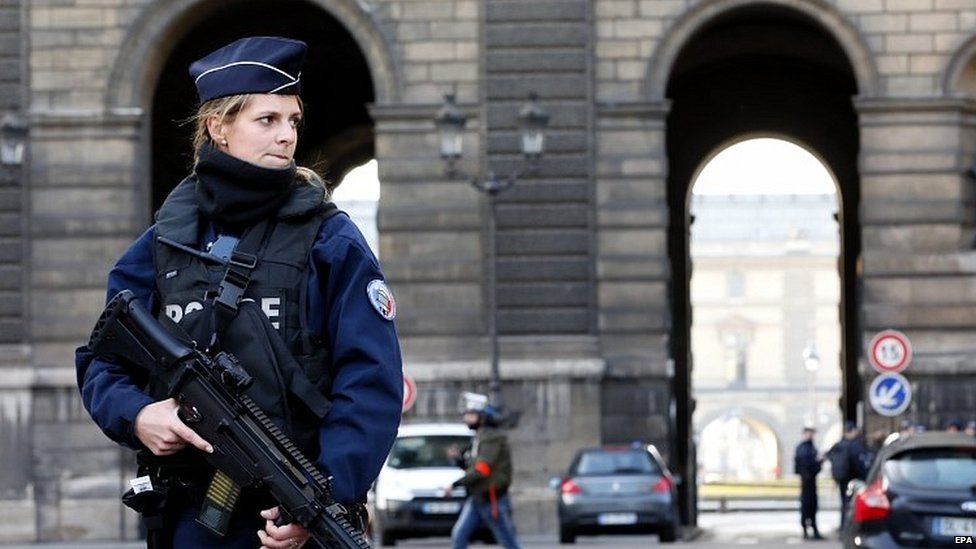UK 'can't keep European Arrest Warrant after Brexit'
- Published

The UK will be kicked out of the European Arrest Warrant deal after Brexit, EU chief negotiator Michel Barnier has said.
The warrant allows EU members to request the arrest and detention of criminals in other countries without extradition talks between them.
The UK wants to stay part of the system when it leaves the EU next March.
But Mr Barnier said the UK could not, because of its desire to leave the EU's court and free movement scheme.
The EU would consider setting up a "streamlined" extradition process with the UK instead, said Mr Barnier.
His words are not likely to go down well with the UK's Brexit Secretary David Davis, who earlier this month singled the European Arrest Warrant out as one of the cornerstones of post-Brexit security co-operation with the EU.
He said it had "brought dangerous people swiftly to justice" and "played a crucial role in supporting police co-operation, not least in Northern Ireland and Ireland".
Mr Barnier said "facts have consequences" and the UK's decision to leave the EU and its single market meant things could not stay the way they were now.
He said the UK's decision to opt out of free movement rules and largely end the jurisdiction of the European Court of Justice "means that the UK cannot take part in the European Arrest Warrant".
He suggested it would not be "fair" for the UK to keep all the benefits of EU membership.
"They want to maintain all the benefits of the current relationship, while leaving the EU regulatory, supervision, and application framework," he said.
"And they try to blame us for the consequences of their choice. Once again, we will not be drawn into this blame game. It would mean wasting time we don't have."
Mr Barnier said that aside from the European Court of Justice the arrest warrant was also underpinned by the EU Charter of Fundamental Rights and by the concept of EU citizenship.
He added: "Today we know that the UK is not ready to accept the free movement of people, the jurisdiction of the court and the Charter of Fundamental Rights - for the charter, this was confirmed last week by the House of Commons.
"This means that the UK cannot take part in the European Arrest Warrant."
The EU's remaining 27 countries would continue to share information from passenger name records and the UK would not have automatic access to EU-only police databases or those of countries in the Schengen zone, he said in a speech in Vienna.
Similarly, while the UK would be shown analysis done by Europol relating to live criminal investigations, it would not be able to "shape the direction" of the EU's law enforcement agency or other EU bodies.
'Operational consequences'
Shared efforts to counter money-laundering and terrorist finance must continue, Mr Barnier said, but judicial co-operation in criminal matters could not extend to continued membership of the European Arrest Warrant.
Successive UK governments have remained strong supporters of the European Arrest Warrant - which came into force in 2004 - despite calls from some Tory MPs for it to be renegotiated or reformed.
According to the National Crime Agency, other EU members requested the arrest of 14,279 UK-based suspects in 2015-6, up from 1,865 in 2004. The UK made 241 such requests in 2015-6, leading to 150 arrests.
Speaking at the same event as Mr Barnier, leading MEP Guy Verhofstadt said "solutions were possible" to ensure public safety was not compromised by Brexit but he made clear the status quo was not an option.
"They cannot be simply based on continuing the same processes as before," he said.
In response, the Department for Exiting the European Union said protecting the public was an "absolute priority".
"Any drop in the breadth and quality of co-operation would have a direct impact on public safety and on our collective ability to deliver justice across Europe," a spokesman said.
Earlier this year the chief constable of the Police Service of Northern Ireland said non-participation in the scheme was "probably the biggest practical vulnerability" facing law enforcement in Northern Ireland post-Brexit.
George Hamilton told a House of Lords committee there would be "very real operational consequences if there are no alternative arrangements in place around exchange of material and people by way of a European arrest warrant".